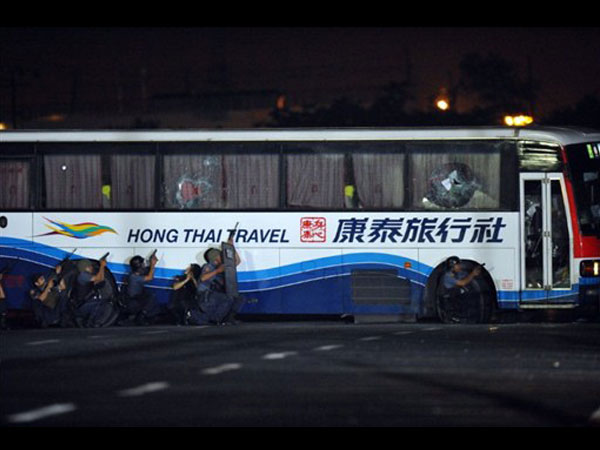
In this file photo taken on August 23, 2010, Philippine policemen take position as they start their attack on a hijacked tourist bus in Manila. AFP FILE PHOTO
MANILA, Philippines – The status of thousands of Filipino domestic workers in Hong Kong should not be used as leverage in the Chinese territory’s demand for a categorical apology from the Philippine government for the killing of eight Chinese tourists in the hijacking of a tourist bus by a disgruntled policeman in Manila three years ago, the Department of Foreign Affairs said Saturday.
The foreign office made the statement in light of one Hong Kong political party’s proposal to ban Filipino domestic workers until the Aquino administration issues a formal apology for the deaths, blamed on the bungled rescue by Philippine police.
“Let us de-link the issue from the Filipino workers in Hong Kong whose dedication to their work and high skill set have contributed to the society and economy of Hong Kong,” said Assistant Secretary Raul Hernandez, the DFA spokesperson.
He cited the long-standing presence of Filipinos in the former British colony, adding that most Hong Kong residents shared a different view from lawmaker Albert Chan Wai-yip, who led the ban call.
“For more than a century, Hong Kong has been hospitable to the presence of Filipinos, from the revolutionaries of the 19th century to the domestic workers during the last few decades,” said Hernandez.
“We believe that the majority of the Hong Kong people and their government will continue to welcome Filipino workers, businessmen and tourists to Asia’s World City, as we continue to find ways to resolve the issues surrounding the Aug. 23 (2010) incident,” he added.
Roughly 160,000 Filipino domestic workers are employed in Hong Kong.
Hernandez said the Philippines continued to work with the Hong Kong government to resolve the emotionally-charged issue.
President Benigno Aquino III himself had to face Hong Kong’s unmet demand for an apology again during the recent Asia Pacific Economic (Apec) Forum’s meeting in Bali, when Hong Kong journalists brought up the issue in a way that displeased the Indonesia organizers. The group was kicked out of the event for disrespecting the Philippine leader.
The President did not offer any apology during a meeting with Hong Kong Chief Executive Leung Chunying on the sidelines of the Apec summit but again extended the country’s condolences and regret over the killings.
The DFA explained that the incident “has been fully settled” and that “financial tokens of solidarity” have been sent to the victims’ families.
Chan’s political party, called People Power and described as a “radical pan-democratic group,” had proposed legislation to halt the employment of Filipino domestic workers until Hong Kong receives Manila’s apology.
The proposal has been “met with reservations” by other Hong Kong officials and even relatives of those lost, wary of its possible impact on the city in general, the Post reported.
Hong Kong’s continuing frustration over the Philippine government’s response stems from the 2010 bus hostage crisis, in which disgruntled police officer Rolando Mendoza took 22 Hong Kong tourists hostage while on tour of Manila.
Mendoza was known to have killed the eight victims before police shot him dead, but Philippine authorities drew Hong Kong’s ire for the bungled rescue.
Hong Kong has maintained a black travel alert on the Philippines since the bus tragedy, advising residents against all kinds of travel to any part of the country.
RELATED STORIES
Hong Kong chief meets Aquino, but no apologies over hostage crisis
Aquino expresses ‘regret’ over HK deaths
Apec kicks out 9 HK journalists
8 Hong Kong tourists killed in hostage crisis